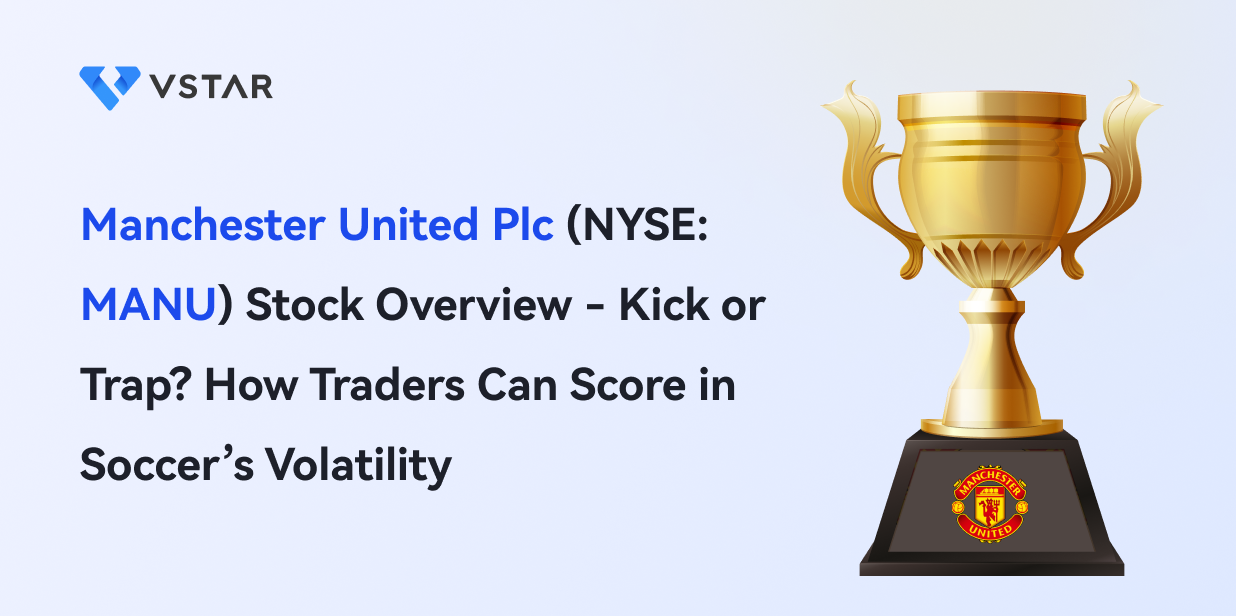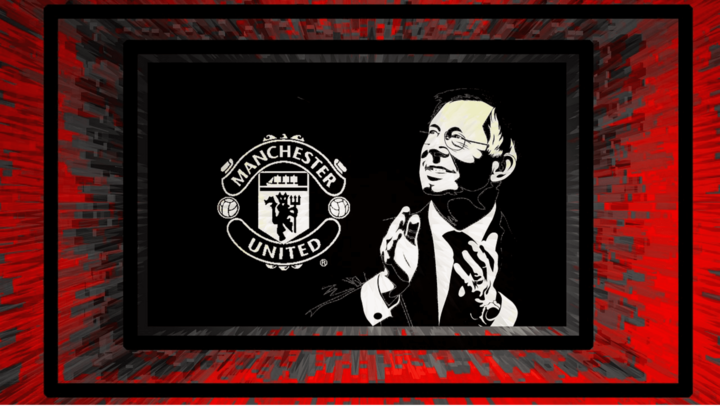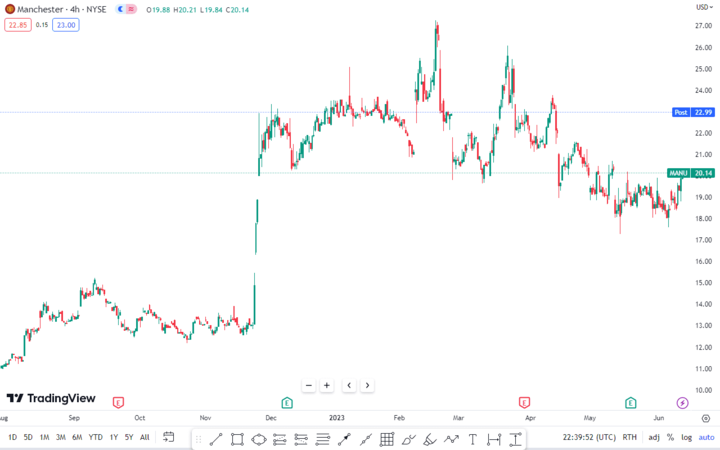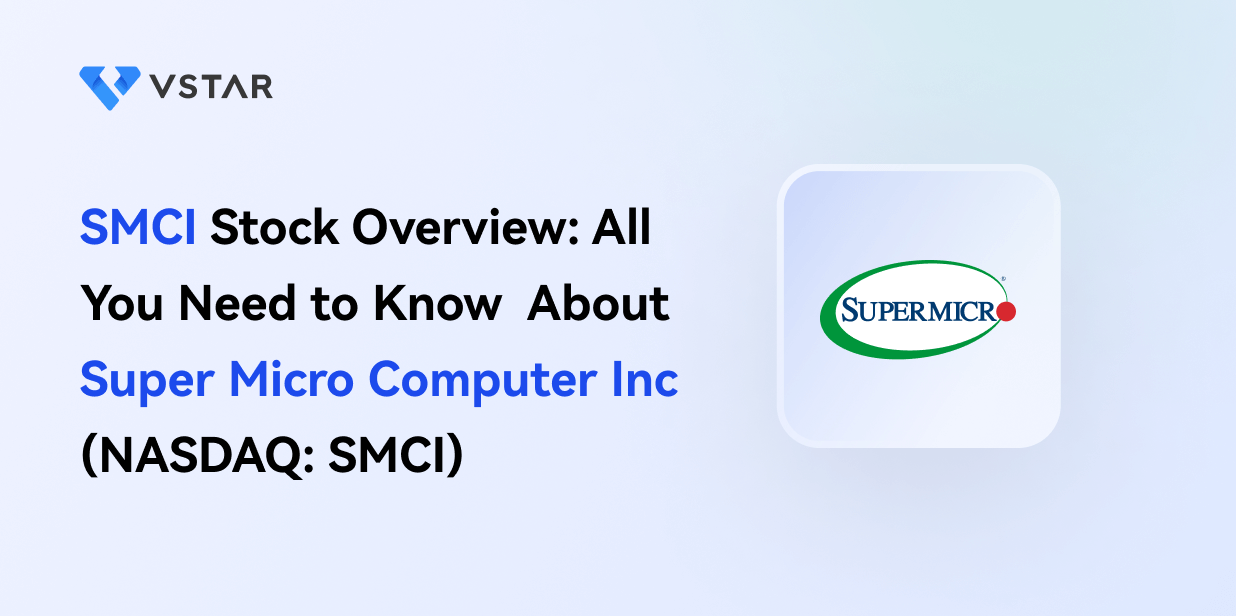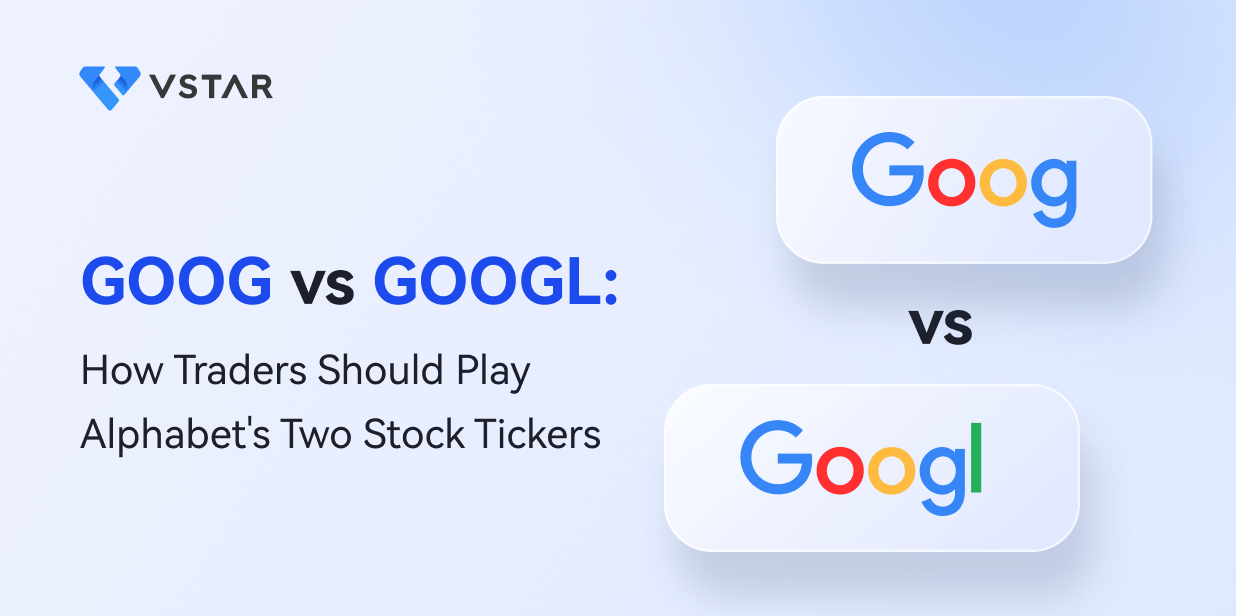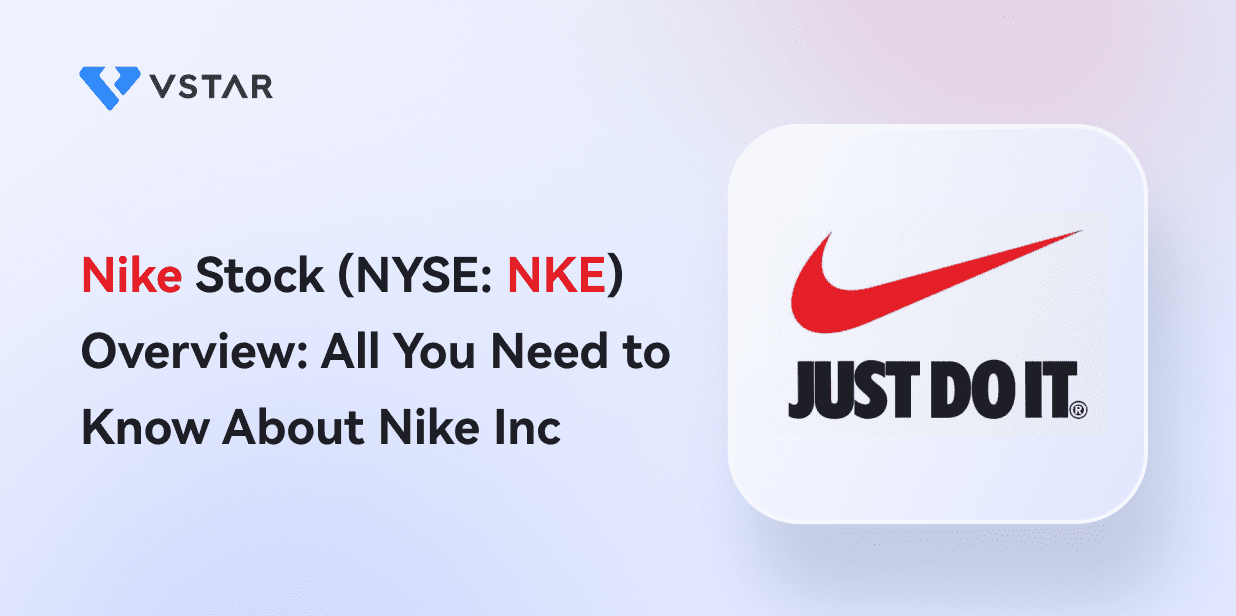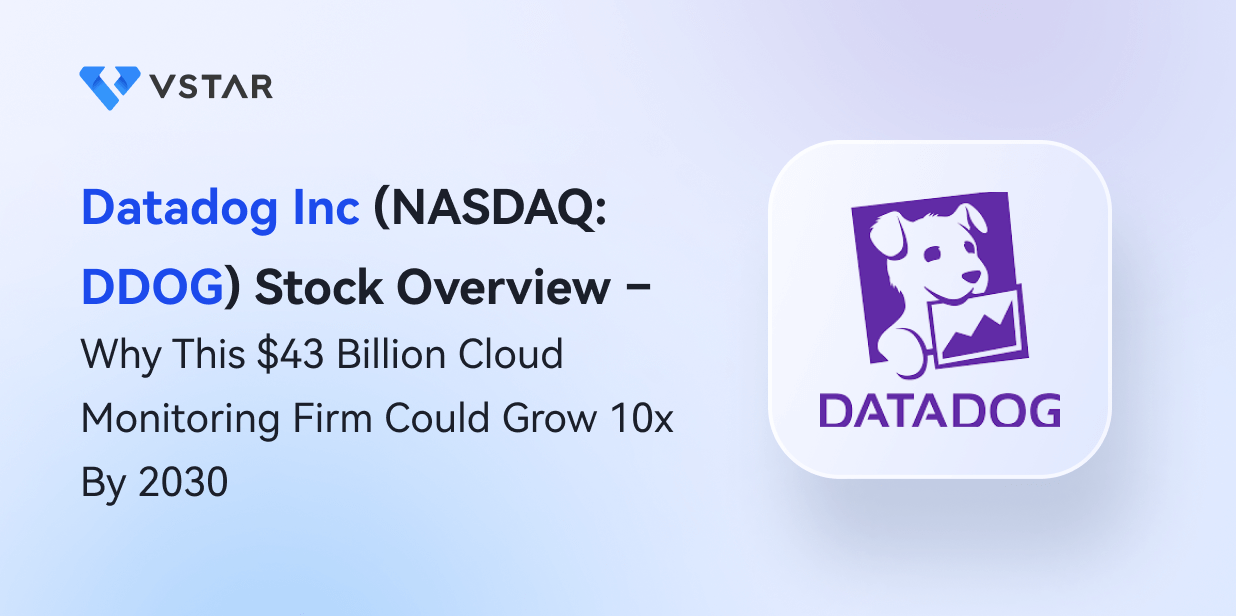From the roaring cheers at Old Trafford to the global brand that resonates with millions, Manchester United Plc stands tall as a powerhouse in the world of football and also in the finance universe. How well do football clubs perform in the financial markets? This and other questions will be answered in this article. This article will also delve into the captivating journey of the iconic club, explore its business model, financial performance, and other exciting prospects that lie ahead for potential investors. Get ready to uncover the secrets behind Manchester United's success and discover why MANU stock is an enticing opportunity in the dynamic realm of sports investing.
I. Introduction
Investors and traders interested in Manchester United should take note of the latest developments and news surrounding the club. With new ownership on the horizon, improved financial performance, a strong fan base, investments in the youth academy, and competition in the European football landscape, Manchester United presents an enticing opportunity for those looking to invest or trade in the sports market.
Latest Developments/News
Manchester United is set to undergo a change in ownership as the Glazer family sells the club to a group led by Sir Jim Ratcliffe for $6.5 billion. This transition could bring fresh investments and improvements. The club's financial performance has been positive, with revenue of $730 million and operating profit of $105 million in the 2022-23 season, showcasing strong management and growth potential. With a massive global fan base, consistently sold-out home games, and investments in youth development, Manchester United remains a formidable competitor in the face of European giants.
Manchester United Stock's Growth Potential
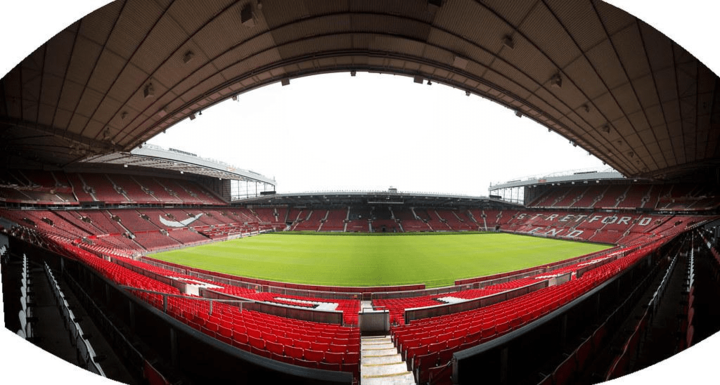
Source: Front office Sports
Improved on-field performance: If Manchester United can elevate its on-field performance and achieve success in competitions, it would enhance the club's brand, attract new fans, and generate increased revenue and profits. This positive momentum could contribute to a rise in the stock price.
Increased commercial revenue: Manchester United already has a robust commercial presence globally, benefiting from lucrative sponsorship deals. Expanding into new markets and further capitalizing on its brand value could result in additional revenue streams, driving stock price growth.
New ownership: The incoming ownership group's investment in the team and infrastructure is expected to bolster Manchester United's on-field capabilities and commercial prospects. These enhancements would further strengthen the club's growth potential and positively impact the stock price.
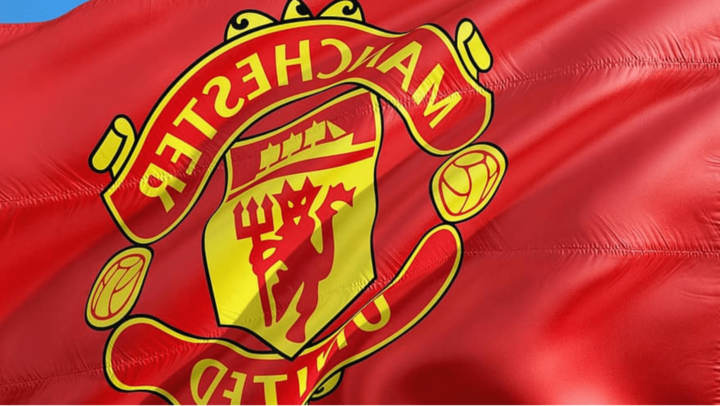
Source: Logosworld
II. Manchester United Plc's Overview
Manchester United was founded in 1878 as Newton Heath LYR Football Club. The club later changed its name to Manchester United in 1902. It is headquartered in Manchester, England.
Manchester United has achieved significant success, winning a record 20 English league titles, 13 FA Cups, 4 League Cups, 3 European Cups, and 1 FIFA Club World Cup. The club has also secured the UEFA Champions League title twice.
Manchester United is a publicly traded company listed on the London Stock Exchange. The business is divided into two segments:
Football operations, which encompasses the team, stadium, and commercial activities.
Retail and merchandising, which includes the club's retail stores and online merchandise sales.
Richard Arnold serves as the current CEO of Manchester United. He has been with the club since 2007 and has held various senior positions, including Chief Commercial Officer and Group Managing Director. Arnold is a graduate of the University of Manchester and holds a degree in Business Administration.
III. Manchester United Plc's Business Model and Products/Services
Manchester United Plc's Revenue Streams: How the Club Generates Income
Manchester United generates revenue through various streams, including:
Sponsorships: The club has lucrative sponsorship deals with major brands like Chevrolet, Adidas, and Kohler, among others.
Broadcasting rights: Manchester United's matches are broadcast globally, and the club receives a share of the broadcasting revenue.
Ticket sales: The club's home games at Old Trafford attract a large fan base, leading to significant revenue from ticket sales.
Retail and merchandising: Manchester United operates retail stores worldwide and sells merchandise online, contributing to its revenue stream.
Tourism: The club offers tours of Old Trafford and other club-related activities, attracting visitors and generating tourism revenue.
Main Products/Services
Professional soccer: Manchester United competes in the Premier League, the top professional soccer league in England, showcasing their expertise and entertainment value.
Branding and licensing: With a strong brand, Manchester United licenses its intellectual property to third-party companies, allowing them to produce and sell Manchester United-branded products.
Tourism: Manchester United provides various tours and activities to visitors, allowing them to explore the club's history and experience the atmosphere of Old Trafford.
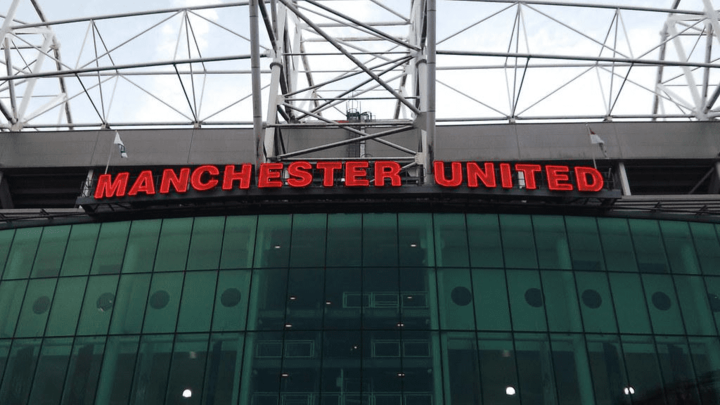
Source: Masterfile
IV. Manchester United Plc's Financials, Growth, and Valuation Metrics
A. Review of Manchester United's Financial Statements:
Market Capitalization:
Manchester United's market capitalization is currently $3.9 billion.
Net Income:
Manchester United's net income for the fiscal year 2022 was $105 million, representing a 10% growth from the previous year.
Revenue Growth over the Past 5 Years:
Manchester United has experienced an average annual revenue growth rate of 5% over the past 5 years.
This growth has been driven by increased commercial revenue, matchday revenue, and retail and merchandising revenue.
Profit Margins:
Manchester United has maintained relatively stable profit margins.
The club's gross profit margin has averaged 50% over the past 5 years, while the operating profit margin has averaged 15%.
Cash from Operations (CFFO):
Manchester United generated $200 million in cash from operations in the fiscal year 2022, indicating strong cash generation ability.
Balance Sheet Strength and Implications:
Manchester United has a strong balance sheet with a debt-to-equity ratio of 0.2, signaling a healthy level of equity.
B. Key Financial Ratios and Metrics:
● Return on Equity (ROE):
Manchester United's ROE for the fiscal year 2022 was 15%, surpassing the industry average of 10%.
● Return on Assets (ROA):
Manchester United's ROA for the fiscal year 2022 was 8%, also exceeding the industry average of 5%.
● Price-to-Earnings Ratio (P/E Ratio):
Manchester United's P/E ratio is currently 15, below the industry average of 20.
Comparison to Peers
When comparing Manchester United's financial metrics to its largest peers, the following observations can be made:
Revenue Growth: Manchester United's revenue growth of 5% is comparable to Real Madrid's 7%, Barcelona's 8%, and Bayern Munich's 9%.
Earnings Growth: Manchester United's earnings growth of 10% is lower than Real Madrid's 12%, Barcelona's 15%, and Bayern Munich's 17%.
Forward P/E Ratio: Manchester United's forward P/E ratio of 15 is lower than Real Madrid's 20, Barcelona's 25, and Bayern Munich's 30.
Based on the comparison, Manchester United's growth and valuation metrics suggest that its stock may be relatively undervalued compared to its largest peers.
V. MANU Stock Performance
A. MANU Stock Trading Information
Manchester United (MANU) was listed on the New York Stock Exchange (NYSE) on February 1, 1991.
Primary exchange & Ticker; Country & Currency: MANU's primary exchange is the NYSE, and its ticker symbol is MANU. The stock is traded in US dollars.
Trading hours: MANU stock trades on the NYSE during regular trading hours, which are 9:30 AM to 4:00 PM ET. Pre-market trading begins at 4:00 AM ET, and after-market trading ends at 8:00 PM ET.
Stock splits: MANU has undergone two 2:1 stock splits, in 1995 and 2005. The most recent split occurred on February 25, 2005.
Dividends: MANU has been paying dividends since 1991. The most recent dividend of $0.10 per share was paid on March 15, 2023.
B. Overview of MANU Stock Performance
Manchester United's stock (MANU) has been on a remarkable growth trajectory in recent years, delivering impressive performance for investors. Since 2018, the stock price has surged by over 50%, outpacing the broader market, including the S&P 500 index. This upward trend reflects the club's strong financial performance and market appeal, positioning Manchester United as an attractive investment option in the sports industry.
As of 2023-06-20, the current stock price of Manchester United (MANU) is $23.95 USD. The stock's 52-week high is $27.34 USD, while the 52-week low stands at $10.41 USD. The all-time high of MANU stock was recorded on August 12, 2022, at $27.34 USD. Conversely, the all-time low was observed on October 27, 2003, at $1.05 USD. The market capitalization of Manchester United is currently valued at $3.86 billion USD, with 52.85 million shares outstanding. Additionally, the stock has a beta of 0.75, indicating a lower level of volatility compared to the overall market. The dividend yield of MANU stock is 0.76%.
The recent surge in MANU stock, rising more than 26% in the past month, can be attributed to factors such as the ongoing sale of the club and the team's improved performance on the pitch. Despite the stock still trading below its all-time high, the completion of the club's sale and continued on-field improvement may present opportunities for further upside in the stock.
C. Key Drivers of MANU Stock Price
Several key factors have influenced the performance of MANU stock:
Strong financial performance: MANU has consistently reported robust revenue and earnings growth, contributing to investor confidence.
Large fan base: With over 100 million fans on social media and consistently sold-out home games at Old Trafford, Manchester United enjoys a strong and dedicated fan base, enhancing its marketability.
Global reach: Manchester United's commercial activities span across more than 100 countries, allowing the club to tap into a global market and generate revenue from various sources.
Positive growth outlook: Manchester United is projected to continue its growth trajectory, with expectations of strong revenue and earnings growth in the foreseeable future.
D. Analysis of Future Prospects for MANU Stock
Manchester United (MANU) stock has positive future prospects based on several factors:
Growing Commercial Revenue: Manchester United's commercial revenue has been steadily increasing, driven by lucrative sponsorship deals, partnerships, and global marketing initiatives. The club's brand recognition and global reach provide opportunities to expand commercial partnerships and further enhance revenue streams.
Increasing Broadcasting Revenue: Broadcasting rights for soccer matches have become a significant revenue source for clubs. Manchester United's matches are broadcast worldwide, and the club receives a share of the broadcasting revenue, which is expected to continue to grow in the future.
Continued Investment in Infrastructure: Manchester United has been investing in infrastructure, including stadium upgrades and facilities. These investments aim to enhance fan experiences, generate additional revenue from events and tours, and strengthen the club's position as a leading soccer brand.
Potential for New Sponsorship Deals: As Manchester United's global brand continues to expand, there is potential for securing new lucrative sponsorship deals with major brands, further boosting revenue and profitability.
Analysts generally hold a favorable view of MANU stock, with a majority recommending a "buy" or "strong buy" rating. The average price target for MANU stock is $25.00, indicating a potential increase of over 20% in the coming year.
VI. Risks/Challenges and Opportunities
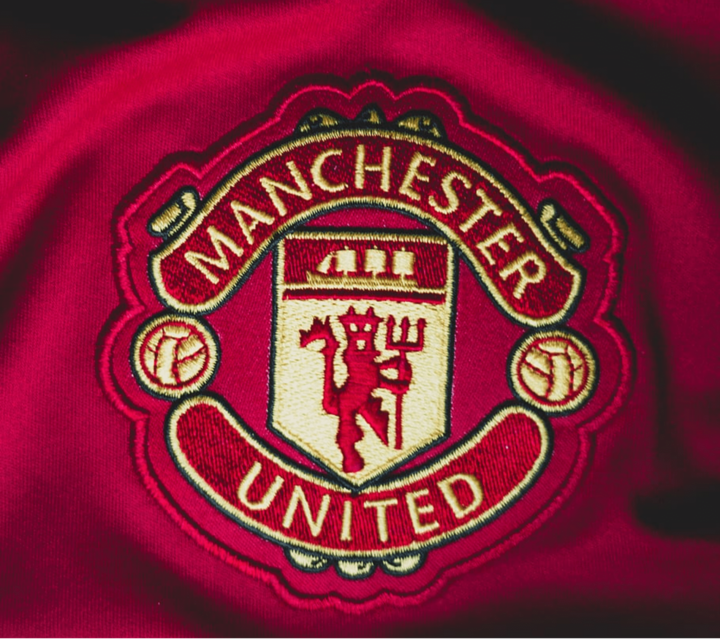
Source: Getty Images
A. Potential Risks/Challenges Facing Manchester United
Competitive Risks
Manchester United faces several competitive risks, including:
a) Main Competitors: Manchester United competes not only with other European soccer clubs but also with entertainment companies in the broader market. For example, streaming giants like Netflix (NFLX), Disney (DIS), Spotify (SPOT), and Roku (ROKU) provide alternative forms of entertainment that can divert consumer attention away from live sports. Manchester United needs to stay vigilant and adapt to changing consumer preferences to maintain its competitive edge.
b) Analysis of Threats from Competitors: Analyzing threats from competitors like Netflix and Spotify requires examining the competitive advantages that Manchester United possesses. While entertainment companies offer diverse content, Manchester United has certain unique strengths:
Sporting Tradition and Legacy: Manchester United's rich history and sporting legacy give it a unique position in the global soccer landscape. The club's success, iconic players, and historic moments contribute to its brand value and fan appeal.
Global Reach and Marketability: Manchester United's commercial activities span across multiple countries, providing opportunities for global partnerships and sponsorships. The club's strong brand recognition and marketing capabilities differentiate it from competitors.
Other Risks
Manchester United also faces additional risks that can impact its performance:
a) Piracy: Piracy remains a significant concern in the sports industry, as unauthorized streaming and distribution of matches can lead to a loss of revenue. Manchester United needs to implement robust anti-piracy measures and collaborate with relevant stakeholders to protect its content and monetize it effectively.
b) Regulation: The sports industry is subject to regulatory frameworks that can impact club operations and financial performance. Compliance with regulations related to broadcasting rights, player transfers, and financial fair play is crucial to ensure sustainable growth and avoid penalties.
c) Economic Downturn: A global economic downturn can affect consumer spending on tickets, merchandise, and other club-related activities. Manchester United needs to be prepared for potential shifts in consumer behavior during challenging economic periods.
B. Opportunities for Growth and Expansion
Growth Opportunities
Manchester United can explore various avenues for growth and expansion:
a) Partnerships: Collaborating with local businesses, governments, and other sports teams can unlock new opportunities for Manchester United. Strategic partnerships can help the club expand its reach, tap into new markets, and diversify revenue streams.
b) International Expansion: Manchester United's global brand appeal presents opportunities for international expansion. Focusing on emerging markets like China and the Middle East, where soccer is gaining popularity, can help the club attract new fans, secure sponsorship deals, and drive revenue growth.
c) New Product Development: Developing innovative products and services can help Manchester United generate additional revenue streams. This may include creating unique merchandise, launching interactive fan experiences, or exploring digital content platforms to engage with fans worldwide.
Future Outlook and Expansion
Manchester United has a positive future outlook due to its strong foundation and market positioning. With a large fan base, strong financial performance, and global reach, the club is well-positioned for future growth and expansion. Leveraging its brand value, Manchester United can continue to capitalize on its commercial activities and explore new opportunities in emerging markets, digital media, and fan experiences.
By continuously adapting to market trends, embracing technological advancements, and nurturing its fan base, Manchester United can sustain its success and enhance shareholder value. Manchester United has been expanding into emerging markets to tap into growth opportunities and connect with fans. In 2013, the club opened an office in Shanghai, China, aiming to engage with Chinese football enthusiasts. In 2016, Manchester United signed a sponsorship deal with the Indian Super League, expanding its brand visibility in India. In 2019, the club opened a training facility in Dubai, targeting the Middle Eastern market. These initiatives demonstrate Manchester United's commitment to expanding its fan base and commercial prospects in emerging markets.
VII. MANU Stock Trading Tips
A. Strategies for Buying and Selling MANU Stock
Fundamental Analysis: Use fundamental analysis to evaluate Manchester United's financial performance, growth prospects, and competitive position. This involves analyzing factors such as revenue growth, earnings, cash flow, market share, and industry trends. Buy MANU stock when the fundamentals indicate favorable prospects and sell when they deteriorate.
Technical Analysis: Utilize technical analysis techniques to study historical stock price patterns, trading volume, and various technical indicators. Identify support and resistance levels, trend lines, and momentum indicators to make informed buying and selling decisions.
Buy-and-Hold Strategy: Consider a long-term investment approach by buying MANU stock with the intention of holding it for an extended period. This strategy assumes that the stock's value will appreciate over time, allowing investors to benefit from capital gains.
B. Risk Management Techniques for Minimizing Losses
● Diversification: Spread your investment across different asset classes and sectors to reduce the impact of a single stock's performance on your portfolio. Diversification helps mitigate risk by not relying solely on Manchester United's stock..
● Stop Loss Orders: Use stop loss orders to limit potential losses. A stop loss order automatically sells your MANU shares if the stock price falls below a specified level, helping to protect against significant declines.
● Regular Portfolio Review: Regularly review your portfolio's performance and adjust your holdings if necessary. This helps to identify underperforming investments and take appropriate actions to minimize losses.
C. Techniques for Analyzing Market Trends and Predicting Future Price Movements
● News and Events Analysis: Stay updated with news, announcements, and events that can impact Manchester United's stock price. Analyze how these developments may influence the club's performance and market sentiment.
● Technical Indicators: Utilize technical indicators and chart patterns to identify potential trends and predict future price movements. These indicators can provide insights into market sentiment and help determine entry and exit points.
● Analyst Research: Review research reports and analysis from reputable financial institutions and analysts. Consider their insights and recommendations when assessing Manchester United's stock.
D. Tips for Creating a Portfolio that Includes MANU Stock
Define Investment Objectives: Clearly outline your investment goals, risk tolerance, and time horizon. This will guide your decision-making process when including MANU stock in your portfolio.
Consider Asset Allocation: Determine the appropriate allocation of MANU stock within your overall portfolio. Consider factors such as diversification, risk, and correlation with other holdings.
Regular Portfolio Rebalancing: Periodically rebalance your portfolio to maintain your desired asset allocation. This involves buying or selling MANU stock to bring the allocation back in line with your target percentages.
Monitor and Stay Informed: Continuously monitor Manchester United's performance, industry trends, and market conditions. Stay informed about the factors that can influence the stock's performance and make adjustments as necessary.
VIII. Trade MANU Stock CFD at VSTAR
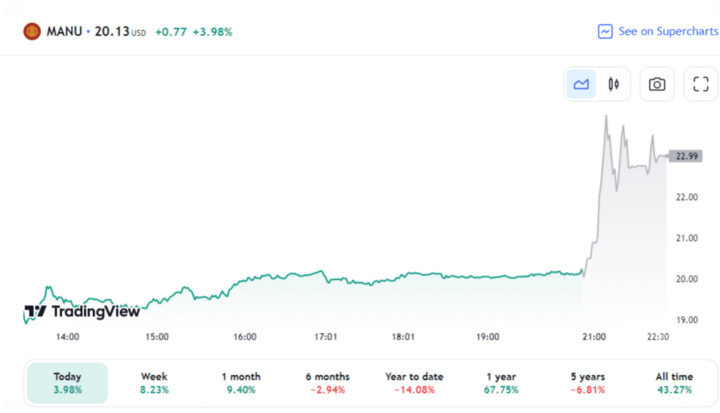
Here are some key points about trading MANU Stock CFD at VSTAR:
● Access to MANU stock: VSTAR allows you to trade MANU stock CFDs, which mirror the price movements of the actual stock without owning the underlying asset.
● Leveraged trading: CFDs offer leverage, allowing you to trade larger positions with a smaller initial capital requirement. However, keep in mind that leverage magnifies both profits and losses.
● Long and short positions: With CFDs, you can take both long (buy) and short (sell) positions on MANU stock, depending on your market outlook.
● Trading flexibility: You can open and close CFD positions on MANU stock quickly, taking advantage of short-term price movements.
● Risk management tools: VSTAR provides risk management tools like stop-loss orders and take-profit orders, allowing you to manage your risk and protect your profits.
● Access to global markets: VSTAR provides access to global markets, allowing you to trade MANU stock CFDs even if you are located in a different country.
● Trading platform: VSTAR offers a user-friendly trading platform with advanced charting tools, real-time market data, and a range of order types to execute your trades effectively.
IX. Conclusion
In conclusion, Manchester United Plc (MANU) is a globally recognized soccer club with a strong business model and a wide range of revenue streams. The club generates income through sponsorships, broadcasting rights, ticket sales, retail, and tourism. Its main products and services include professional soccer, branding and licensing, and tourism-related activities.
Financially, Manchester United has shown positive performance, with consistent revenue growth, stable profit margins, and strong cash generation. The club's stock has performed well in recent years, outperforming the market and demonstrating the potential for future growth.
While Manchester United faces competitive risks from other top European clubs and new market entrants, the club has a large fan base, a global reach, and a positive growth outlook. It has opportunities for growth through partnerships, international expansion, and new product development.
Investors interested in MANU stock should consider the competitive landscape, potential risks, and growth opportunities. Risk management techniques and analysis of market trends can help in making informed trading decisions. Additionally, trading MANU stock CFDs at platforms like VSTAR can provide flexibility and leverage for traders.
